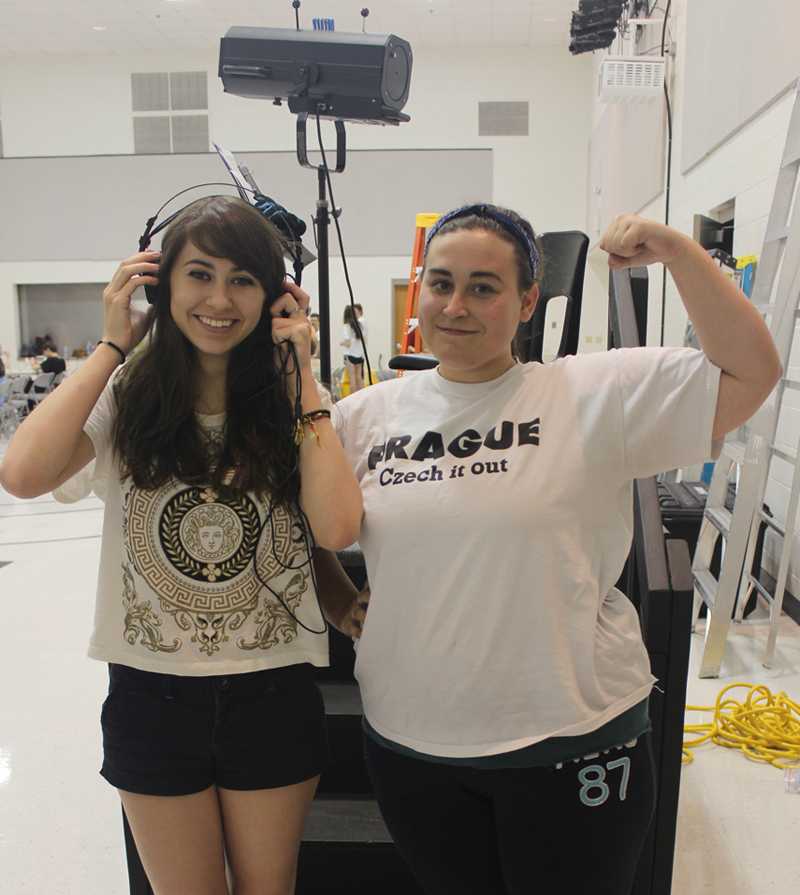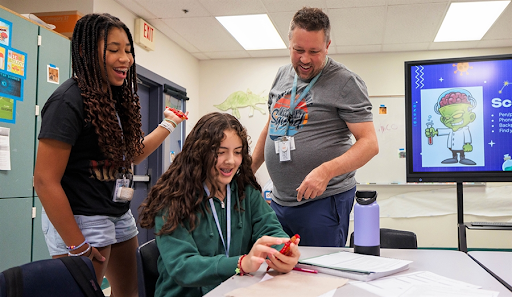When watching anything, be it a theatrical production, movie, or television show, it’s easy to only think about the end product. This is especially true in theater; audience members will hopefully leave the show thinking about the plot, the scenery, and most notably the actors who brought a story to life. It would be impossible to make a show happen without the cast, but an equally important and majorly overlooked component of a show is the crew. Without a tech crew, actors would be without costumes, lighting, props, or a set. The work that goes into the technical aspect of a show is commonly dismissed as part of the magic or is overlooked entirely. Here at Horizon Honors, the drama program raised the sets on April 6th for the spring musical Curtains, a comedic murder mystery. Because it features a show within the show, this production has given both the cast and crew some challenges and opportunities unique to any show performed at our school; the actors are playing actors, and crew appears onstage as the crew within the show. This has allowed our often hid techies a moment to shine. Trading in their typical uniform of head to toe black “ninja” gear, they’ve put on working clothes of the era and hopped into the spotlight for the first time. Andi Vitagliano, grade 11, is a tech crew veteran who answered some questions about how exactly the job works. “The hardest part of tech is getting everything down and working with cues,” she told me. After working in the booth, the area behind the audience with the machinery necessary to run lights and sound, for five shows with vocal and musical sound, she commented, “Sitting through the shows multiple times without zoning out ever is hard. You can never check out- it’s a high pressure job.” She was very modest in describing her skill set, only saying that her past experience on crew helps her manage a hard job, but she downplayed the extreme pressure in her position. Working the microphones for actors is daunting and crucial to the success of any musical. “My skills as a band student also carry over. I’ve learned to listen to the balance between music and voices,” she explained. “You have to balance a tenor with the back music differently than you would a bass.” When asked what keeps her coming back, she said, “Techies are the biggest fans and support for actors. They can’t do it without us.”
Lauren Farrow, also grade 11, is the current stage manager for Curtains. “I joined crew because I’d heard so much about the shows, and knew it would be a fun experience.” Her first show working tech was Guys and Dolls, the 2012 spring musical. However, she was promoted quickly- by the time the fall productions rolled around, she became the stage manager for two shows, Jekyll’s Hydes and The Mouse That Roared. This leap from beginning stage crew to a taxing leadership position was a big one, but Farrow was up to the challenge. “I definitely don’t regret it. The experience is too rewarding.” She said the hardest part of working behind the scenes is staying organized and on top of things, a crucial quality needed in the person who manages scene changes, has notes on all blocking, organizes props in tandem with the prop master, and handles backstage issues, injuries, and occasional disasters. She agrees about the confidence tech brings, saying, “…the most rewarding part of the process is helping people come out of their shells and feel better about themselves.” Crew is normally made up of complete beginners or actors trying out a new position. Farrow said the opportunity to be on stage during this show has made it harder to make scene changes happen. “All the set changes happen because of line cues and moments in the music. There aren’t many complete blackouts. If crew makes mistakes, it’ll change the plot of the show.”
Vitagliano and Farrow are only two of many crew members who each bring a unique set of skills to the production. Every single person involved in a show becomes vital as the process develops; they are each irreplaceable, and tech crew doesn’t get the glory or recognition the actors receive. They’re rarely noticed at all, but that’s the point. If they do their job correctly, their existence itself remains unknown to the audience. I’ve worked tech and acted on stage (most crew members at Horizon have), and believe that it requires a different kind of courage to work on crew. It teaches you how to do an excellent job for a team and not solely yourself. Hard work without audience recognition or applause is tough, but tech crews gives you a sense of self pride that’s impossible to replicate in any other way. Moving into tech week, the entire production team is stepping up their game in preparation for the final step in the process. If you come to see Curtains, try keep an eye out for the folks in button downs and head scarves darting behind set pieces and running the booth, and if you get a chance, thank them for their hard work throughout.














